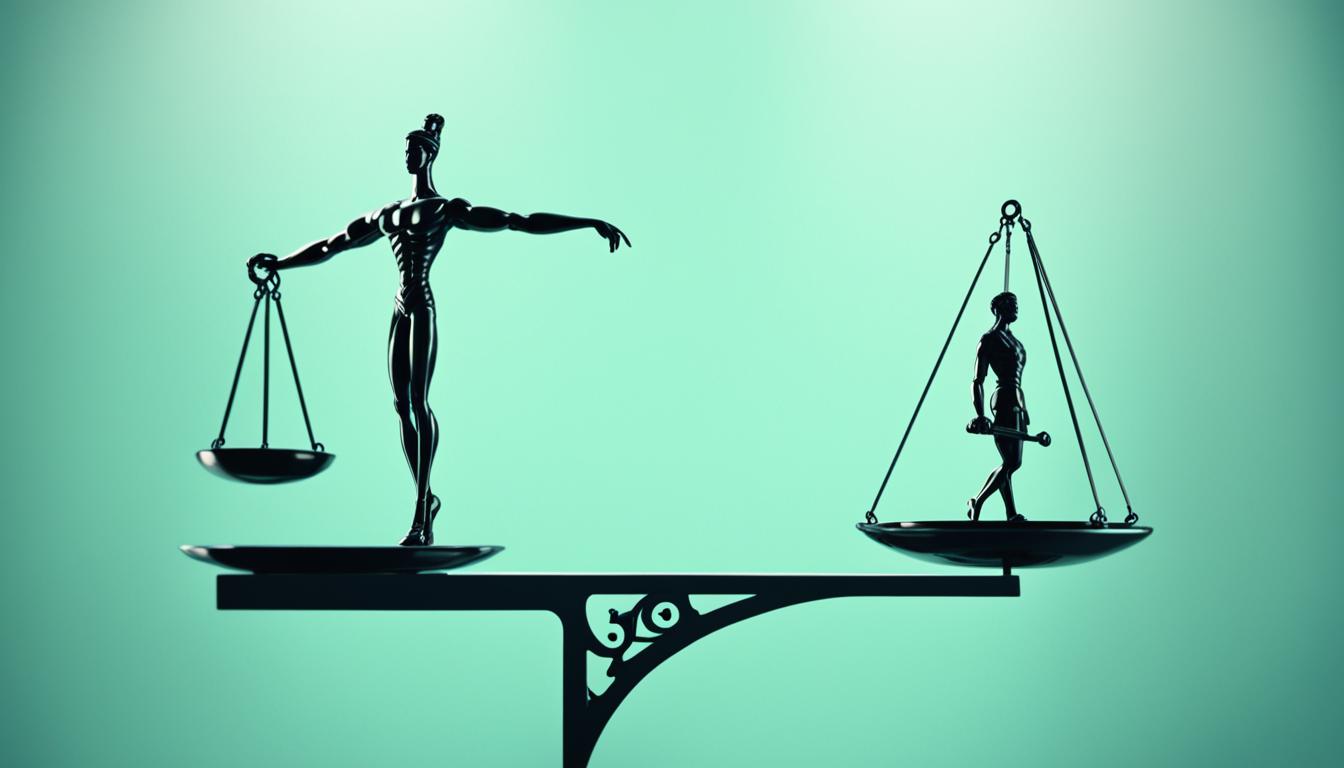When it comes to pursuing a career in the creative arts, we understand the passion and dedication it takes to bring your unique vision to life. However, amidst the excitement of creating, it’s important not to overlook the legal considerations that come with this territory. From safeguarding your intellectual property to navigating contract negotiations, being well-versed in the legal landscape can protect your work and ensure a successful and fulfilling career.
Key Takeaways:
- Understand and protect your intellectual property rights, including copyright, licensing, fair use, and trademarks.
- Negotiate contracts effectively, seeking legal advice when necessary, and ensuring clear terms for royalties and rights and usage agreements.
- Stay informed about tax obligations, track deductible expenses, and consult with professionals to manage your financial responsibilities.
- Establish clear collaborations and ownership agreements, including written agreements and understanding work-for-hire arrangements.
- Maintain an online presence carefully, respecting privacy rights, understanding social media terms of service, and copyright regulations.
By taking these steps, you can navigate the legal landscape with confidence, protecting your artistic integrity and setting yourself up for a successful career in the creative industry.
Intellectual Property: Safeguarding Your Creations
Protecting our creations as artists is of utmost importance. Intellectual property rights play a vital role in ensuring that our work is safeguarded. Understanding the key concepts of copyright, licensing, fair use, and trademarks is essential to navigate the legal landscape and protect our artistic endeavors.
Copyright: Preserving the Originality
Copyright is a legal framework that grants exclusive rights to creators of original works, including literary, artistic, musical, and dramatic creations. Registering your work with the appropriate authorities provides additional benefits and enhances the protection of your intellectual property.
An original song I composed exemplifies the need for copyright protection. By obtaining copyright, I ensure that my work cannot be used or reproduced without my permission, protecting my rights as the composer.
Licensing Agreements: Controlling Usage
When granting others the right to use our intellectual property, licensing agreements play a crucial role in defining the terms and conditions of usage. By having a clear and comprehensive agreement in place, we can maintain control over how our creations are utilized and ensure fair compensation.
“A licensing agreement enabled me to establish a partnership to use my photography in a commercial campaign. By defining the scope of usage and setting financial arrangements, I was able to protect my rights and receive appropriate compensation for my work.”
Fair Use: Understanding the Exceptions
Fair use is the limited and transformative use of copyrighted material without obtaining permission from the copyright owner. It allows for certain purposes such as criticism, commentary, news reporting, teaching, and research. Understanding the principles of fair use helps us determine the boundaries of using copyrighted material without infringing on others’ rights.
Trademark Registration: Brand Protection
Trademarks are essential for artists who want to protect their personal brands. By registering a trademark, we establish exclusive rights to use a particular name, logo, or symbol in connection with our artistic endeavors. This prevents others from using similar marks that could cause confusion in the marketplace.
The following table provides a summary of the key concepts related to intellectual property:
| Concept | Description |
|---|---|
| Copyright | Grants exclusive rights to creators of original works |
| Licensing Agreements | Specify terms and conditions for using intellectual property |
| Fair Use | Allows limited use of copyrighted material for certain purposes |
| Trademark Registration | Protects personal brands by establishing exclusive rights |
Contracts: Navigating Agreements Effectively
When it comes to the creative world, contracts serve as the backbone for every successful project. Understanding the intricacies of contract terms, seeking legal advice, and negotiating fair compensation are vital steps for artists. By ensuring the clear definition of royalties, rights, and usage agreements, artists can protect their interests and foster mutually beneficial collaborations.
Consulting Legal Professionals
As artists, we possess a deep understanding of our craft, but navigating the legal complexities of contracts may be unfamiliar territory. Seeking legal advice from professionals experienced in creative industries can provide invaluable insights and ensure that our rights are protected. They can guide us through the contractual language, review important clauses, and help negotiate fair terms and compensation.
Negotiating Fair Compensation
One of the most crucial aspects of any contract is negotiating fair compensation. As artists, our work is intrinsically tied to our livelihoods, and it is essential that we are adequately compensated for our contributions. This includes defining the scope of royalties and ensuring that proper payment structures are in place. By negotiating fair compensation, we can establish a solid foundation for successful collaborations and protect our creative endeavors.
Defining Rights and Usage Agreements
Rights and usage agreements are vital components of any contract. They determine how our work will be used, distributed, and shared. It is essential to clearly define these agreements to safeguard our artistic vision and maintain control over our creations. This includes specifying the mediums in which our work will be utilized, the duration of usage rights, and any restrictions or limitations we may need to impose.
“Contracts are like the backbone of our creative endeavors, providing structure, peace of mind, and a clear path to success.”
By effectively navigating contracts, we can ensure that our work receives the recognition it deserves and that our artistic integrity remains intact. Let’s take a closer look at how contracts play a pivotal role in managing the legal aspects of creative work:
| Benefits of Effective Contract Management | Pitfalls of Ineffective Contract Management |
|---|---|
|
|

By proactively addressing contract considerations and seeking legal advice, we can navigate the complexities of agreements to protect our artistic work, secure fair compensation, and foster thriving collaborations.
Taxes: Managing Financial Obligations
As freelancers, understanding taxes is crucial for artists to effectively manage their financial obligations. By grasping the intricacies of the tax system, artists can optimize their deductions and minimize their tax burden. One key aspect is tracking deductible expenses, which can significantly impact the overall tax liability.
Consulting a tax professional who specializes in working with freelancers is highly recommended to ensure compliance with tax regulations and maximize potential savings. These professionals can assist in identifying eligible deductions and taking advantage of any available tax credits.
Let’s take a look at some common deductible expenses for artists:
| Expense | Description |
|---|---|
| Art Supplies | Costs associated with materials used for creating artwork. |
| Studio Rent | Rental expenses for a dedicated workspace. |
| Professional Development | Costs related to workshops, classes, and conferences to enhance artistic skills. |
| Studio Equipment | Purchase or lease costs for equipment such as cameras, computers, or musical instruments. |
| Marketing and Advertising | Expenses for promoting artwork, including website hosting, print materials, and online advertising. |
Keep meticulous records of these expenses, as they can be deducted during tax filing season. By managing your finances and taking advantage of deductible expenses, you can ensure you are making the most of your earnings and staying compliant with tax laws.
Image: artists must track deductible expenses to optimize their tax deductions and minimize financial obligations.
Collaborations and Rights Ownership
When artists come together to collaborate on a project, it’s crucial to establish clear agreements and understand the concept of work-for-hire arrangements. These measures can help prevent disputes and ensure proper rights ownership and management.
Collaborations often involve multiple creative minds working together to bring a vision to life. Whether it’s a joint art exhibition, a co-authored book, or a collaboration between musicians, each participant brings their unique talents and ideas to the table. However, without written agreements and a clear understanding of rights ownership, these partnerships can become challenging to manage.
Written agreements: Having written agreements in place is essential for collaborations. These agreements should outline each collaborator’s contributions, responsibilities, and rights to the final work. By clearly defining these terms, artists can minimize misunderstandings and ensure that everyone is credited appropriately for their role.
Collaborations are about teamwork, but it’s still important to clarify individual contributions and rights. With written agreements, there are no gray areas, and everyone involved knows where they stand. It’s an essential step in fostering a successful and harmonious partnership.
Work-for-hire arrangements: In certain collaborations, there may be a need for work-for-hire arrangements, particularly in industries such as film, music, and graphic design. In these cases, one party commissions another to create a specific work, and the rights to that work are transferred to the commissioning party.
Work-for-hire arrangements can be beneficial for projects with clear roles and expectations. However, it’s crucial to establish these agreements beforehand and clearly define the scope of the work and the ownership of rights. This ensures that all parties understand and agree to the terms of the arrangement.
By creating collaborations based on written agreements and having a clear understanding of work-for-hire arrangements, artists can navigate rights ownership effectively. This not only safeguards the integrity of their work but also fosters a positive and mutually beneficial working relationship.

Online Presence and Social Media
In today’s digital age, maintaining an online presence is crucial for artists to showcase their work, connect with their audience, and expand their reach. However, along with the benefits of increased visibility come important legal considerations that artists should be aware of to protect their privacy rights, navigate the terms of service, and adhere to copyright regulations on social media platforms.
When sharing their work online, artists must be mindful of privacy rights. Obtaining consent before using images or personal information of others is essential to ensure compliance with privacy laws and respect for individuals’ rights. Being respectful of others’ privacy not only safeguards the artist’s reputation but also fosters trust and positive engagement with their audience.
Understanding the terms of service of social media platforms is equally important. Artists should carefully read and familiarize themselves with the terms and conditions before joining or using these platforms. These terms often outline the rights and limitations regarding content ownership, licensing, and distribution. Awareness of the terms of service empowers artists to make informed decisions about the visibility and accessibility of their work.
“It’s crucial for artists to be aware of the terms of service on social media platforms. Understanding the rules and limitations helps us protect our rights and make informed decisions about sharing our work.” – Emma Thompson, Visual Artist
Moreover, copyright regulations play a significant role in the online world. Artists should be mindful of their own copyright and respect the copyrights of others. Sharing original work on social media doesn’t mean surrendering copyright. Artists retain the rights to their creations and can set boundaries to protect their work from unauthorized use or infringement. At the same time, artists need to be cautious about using copyrighted materials without permission or proper attribution.
As artists navigate their online presence, it’s crucial to strike a balance between visibility and legal compliance. By respecting privacy rights, understanding terms of service, and adhering to copyright regulations, artists can build a strong online presence while safeguarding their work and maintaining their artistic integrity.
Conclusion
Navigating the legal landscape is essential for artists to protect their work and maintain their artistic integrity. In today’s ever-evolving creative industry, staying informed about legal developments is more crucial than ever. By seeking legal counsel and proactively addressing potential issues, artists can ensure a successful and fulfilling career.
Legal considerations are not just a necessary evil but a vital aspect of safeguarding the fruits of your artistic labor. By understanding intellectual property rights, such as copyright and trademarks, artists can actively protect their creations. Additionally, negotiating fair contracts and defining rights and usage agreements are key steps to maintaining control over your work.
Managing financial obligations is also a significant part of the creative journey. By staying on top of taxes and tracking deductible expenses, artists can optimize their financial health and focus on their craft. Collaborations, while beneficial, require clear agreements to avoid disputes and ensure that all parties understand ownership and rights.
Lastly, maintaining an online presence is crucial for artists in the digital age. By respecting privacy rights, obtaining necessary consents, and understanding copyright regulations on social media platforms, artists can maximize the potential of their online platforms without compromising their rights.
As artists, we have the opportunity to create and share our creative visions with the world. By navigating the legal landscape with diligence and informed decision-making, we can protect our work, maintain artistic integrity, and build a successful career that stands the test of time.
FAQ
What is intellectual property?
Intellectual property refers to the legal rights given to creators of original works, such as music, books, films, and visual art. It encompasses copyright, trademark, and patent laws.
How can I protect my creative work?
To protect your creative work, you can register your copyright with the appropriate authority. This provides legal proof of ownership and allows you to take legal action against infringement. Additionally, trademark registration can protect your personal brand.
What are licensing agreements and fair use exceptions?
Licensing agreements are legal contracts that allow others to use your creative work in exchange for compensation. Fair use exceptions, on the other hand, enable limited use of copyrighted material without permission for purposes such as criticism, commentary, and education.
Why are contracts important in creative work?
Contracts are crucial in creative work to outline the rights and obligations of all parties involved. They help protect your interests by clearly defining royalties, rights and usage agreements, and other terms. Consulting with legal professionals can ensure fair negotiations and a solid legal foundation.
How can I manage my taxes as a freelancer?
Freelancers should keep track of deductible expenses related to their creative work, such as equipment, materials, and business-related travel. It is recommended to consult with a tax professional to maximize deductions, comply with tax regulations, and minimize financial obligations.
What should I consider when collaborating with others?
Collaboration agreements are essential to clarify ownership, rights, and compensation. Understanding work-for-hire arrangements is important to determine who owns the final product. By having clear agreements in writing, you can prevent disputes and ensure proper management of rights.
What legal considerations should I be aware of when maintaining an online presence?
When using others’ images or content on your website or social media platforms, it is important to obtain proper consents or licenses. Familiarize yourself with the terms of service and copyright regulations of the platforms you use to avoid legal issues. Protect your privacy rights and personal information as well.
How can I navigate the legal landscape to protect my work and artistic integrity?
Seek legal counsel to fully understand your rights and obligations as a creative professional. Stay informed about legal developments relevant to your field. Proactively address potential legal issues and take steps to protect your work from infringement. By doing so, you can maintain your artistic integrity and ensure a successful and fulfilling career.




